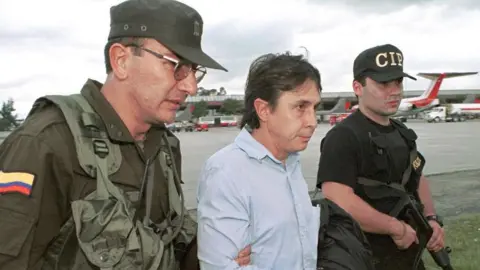Fabio Ochoa, a notorious Colombian drug lord and former member of the infamous Medellin cartel, has regained his freedom after completing over two decades in a U.S. prison. The 67-year-old, once a key player in the global cocaine trade, returned to his homeland this week, marking a controversial chapter in the fight against international drug trafficking.
Ochoa was deported to Colombia on Monday, arriving at Bogota’s El Dorado International Airport. His release came after serving 25 years of a 30-year sentence in the United States for his involvement in a massive drug trafficking conspiracy. Clad in a gray sweatshirt and holding his belongings in a plastic bag, Ochoa was met by Colombian immigration officials but not detained, sparking widespread debate about the legacy of one of the world’s most infamous criminal empires.
A Billion-Dollar Legacy in Cocaine
Ochoa and his two older brothers, Juan David and Jorge Luis, played pivotal roles in the Medellin cartel, which dominated the cocaine trade during the 1980s and early 1990s. Their operations, under the leadership of Pablo Escobar, turned Colombia into the epicenter of a drug network that supplied the United States and other markets.
By 1987, Ochoa and his family had accumulated such wealth that Forbes included them on its list of billionaires. “Fabio was a significant figure in one of the most powerful cartels in history,” said Richard Gregorie, a former assistant U.S. attorney who prosecuted Ochoa.
Operating out of Miami, Ochoa managed a distribution hub that moved staggering amounts of cocaine into the U.S. His connections and resources made him a valuable asset to Escobar, even as internal conflicts and rivalries within the cartel led to violent power struggles.
From Arrests to Extradition
In the late 1980s, U.S. authorities indicted Ochoa for his alleged role in the assassination of Barry Seal, an American pilot turned informant who had flown drugs for the cartel. However, Ochoa avoided extradition by surrendering to Colombian authorities in the early 1990s under a deal that prevented his transfer to the U.S.
The Ochoa brothers were released from Colombian prisons in 1996. Fabio, however, returned to the drug trade, leading to his arrest in 1999. By 2001, he was extradited to the U.S., where he stood trial and received a 30-year sentence, the harshest among his co-defendants.
“Ochoa refused to cooperate with the U.S. government, unlike others who cut deals,” said Gregorie. “He faced the full weight of the justice system and paid the price.”
A Quiet Welcome Home
Upon his return to Colombia, Ochoa was not met with legal challenges. Colombia’s immigration agency confirmed his release with a brief statement, emphasizing that he was “freed so that he could join his family.” The announcement drew criticism from anti-drug advocates, who questioned why a figure so deeply tied to the drug trade was not subject to further investigations or restrictions.
Analysts believe that Ochoa’s release reflects a shift in focus within Colombia and globally. Mexican cartels, such as Sinaloa and Jalisco New Generation, have supplanted Colombian groups as the dominant players in the cocaine trade. “Ochoa’s name doesn’t resonate the way it did decades ago,” said a security expert in Bogota.
A Pop Culture Fixture
Despite his waning influence, Ochoa’s legacy endures in popular culture. He has been portrayed in hit series like Netflix’s Narcos and Griselda, which dramatize his role in the cartel’s rise and its battles for dominance. In Narcos, Ochoa is depicted as the youngest sibling of a wealthy ranching family, contrasting sharply with Escobar’s more humble origins.
“These dramatizations keep the legend of the Medellin cartel alive,” said Maria Lopez, a Colombian journalist who has covered the drug trade’s history. “But they also risk glorifying figures like Ochoa, who brought immense suffering to Colombia.”
Unanswered Questions
Ochoa’s return raises significant questions about the long-term impact of efforts to dismantle drug cartels. While U.S. authorities succeeded in imprisoning many Medellin leaders, the cocaine trade evolved, shifting power dynamics rather than eradicating the problem.
Gregorie speculated that Ochoa’s financial resources remain largely intact. “Authorities never managed to confiscate all of the Ochoa family’s wealth. He won’t be retiring as a pauper,” he noted.
Colombia continues to grapple with the challenges posed by the drug trade, which remains a lucrative and dangerous enterprise. Recent government efforts to address coca cultivation—the raw material for cocaine—have met resistance from rural communities. Many farmers feel stigmatized as criminals despite being economically dependent on coca farming.
A Cautionary Tale
Ochoa’s release is a reminder of the complexities surrounding the war on drugs. It highlights both the successes and limitations of a decades-long effort to combat cartels that once held entire nations hostage to their influence.
For some, his return to Colombia is a sobering symbol of resilience in the face of justice. For others, it is an indication that even the most notorious criminals can evade the full consequences of their actions.
“Fabio Ochoa may no longer be the kingpin he once was, but his story isn’t over,” said Lopez. “The question now is what kind of life he will lead—and whether Colombia is ready to confront the legacies of its past.”

